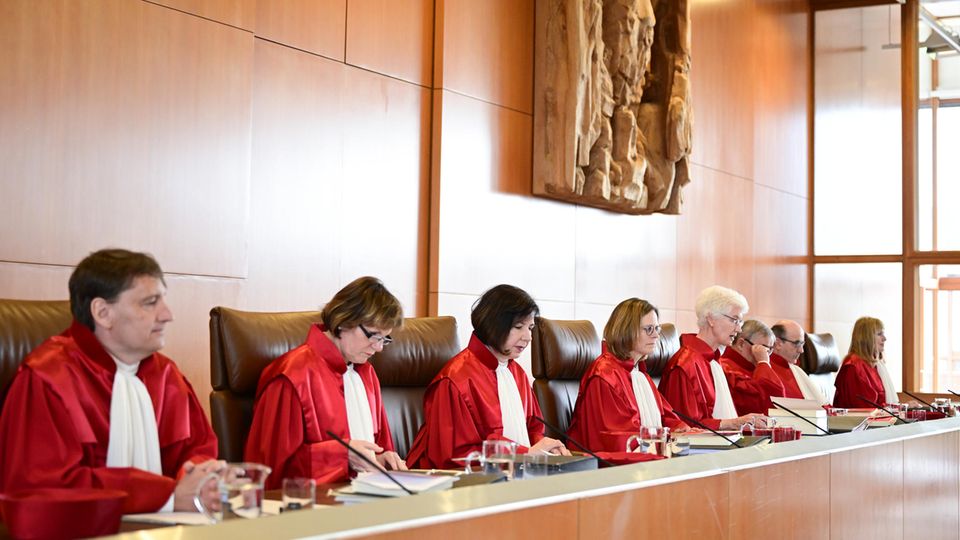Federal Constitutional Court
A suspected murderer gets away: This is how the press comments on the Karlsruhe verdict
The presiding judge Doris König announces the verdict with which the Federal Constitutional Court in Karlsruhe overturns the reform for the resumption of criminal proceedings
© Uli Deck / DPA
The ban by the Federal Constitutional Court in Karlsruhe on retrieving those who have been acquitted is causing debate – including in the comment columns of German newspapers.
A person who has been legally acquitted may not be tried again for the same crime – even if there is new evidence. That has that Federal Constitutional Court decided on Tuesday. A new legal regulation from 2021, according to which a criminal trial can be reopened in the case of certain serious crimes such as murder if new evidence makes a conviction very likely, violates the Basic Law. There is a ban on punishing someone more than once for the same crime. Even multiple prosecutions are prohibited, said court vice-president Doris König when the verdict was announced. The Basic Law protects both people who have been convicted and those who have been acquitted.
The Karlsruhe judges agreed with the suspect in the case of Frederike von Möhlmann, who was killed 42 years ago. The 17-year-old student was raped and killed near Celle in 1981. The suspect was legally acquitted almost two years after the crime due to a lack of evidence. After a new DNA report in 2012 and the change in the law, he was arrested again last year and was due to be brought to trial and had filed a complaint against it.
This is how the press commented on the verdict from Karlsruhe:
“Lausitzer Rundschau” (Cottbus): “It’s hard to bear the thought that a murderer might be walking around at large, even though his crime could be proven beyond a doubt. On the other hand: If others, after an acquittal, have to expect their case to be reopened for the rest of their lives – so be it , because further evidence emerges or because new witness statements have to be taken into account? The Federal Constitutional Court had to weigh up these two aspects and opted for maximum legal certainty. The defendant may be happy about this. The judge’s verdict is certainly a heavy blow for the relatives of the young woman who was killed. It remains the bitter realization: law is not always justice.”
“The Federal Constitutional Court did not decide on justice”
“New Osnabrücker Zeitung”: “Murder does not expire. But should an acquitted murderer be allowed to be tried again? The Federal Constitutional Court – and this is important – did not decide on justice, but on whether a new prosecution is compatible with the German Basic Law. Based on the decision In this specific case, Karlsruhe cannot retry a suspected murderer who could now, after decades, be convicted using DNA evidence. Legally, it can be argued that this is correct, that legal certainty and legal peace are needed for a person “He should not be tried again and again for a crime until he is convicted. But whether this ban in itself is fair is a completely different question.”
“Hannoversche Allgemeine Zeitung”: “It turns out that legal policy bungling in parliament does not lead to more justice. One could have guessed it. Why did Federal President Frank-Walter Steinmeier only hesitantly sign the law at the end of 2021, spoke of constitutional concerns and called for “renewed parliamentary examination and consultation”? recommended? Anyone who wants to allow multiple trials in a legally clean manner would have to change the constitution. But would the necessary two-thirds majorities ever come together in the Bundestag and Bundesrat? Despite all the excitement about a possible – perhaps even blatant – injustice in individual cases, there is everyone’s interest in it general reliability and efficiency of the rule of law. This includes the principle that an acquittal is an acquittal.”
“Allgemeine Zeitung” (Mainz): “Shouldn’t the suspect be allowed to be brought back to court? Yes, says common sense. Yes, the grand coalition also said and in 2021 they tweaked the criminal procedure code so that renewed prosecution is possible in such cases. No, the Federal Constitutional Court has now done so said and therefore declared the change in the law invalid. You can put it this way: The constitutional state has its chance to convict the perpetrator of the crime in court. He doesn’t get a second chance. Does it have to be that way? Yes. Could the constitutional state try again, “That would ultimately open the door to arbitrariness – people could be accused until a conviction is reached.”
“Frankfurter Allgemeine Zeitung”: “In the constitutional state, no one may be punished twice for the same crime. But the old code of criminal procedure, adopted under the Basic Law, contains exceptions. Karlsruhe carves a principle in granite that is by no means stable. This is (…) about the expansion of reasons for readmission special cases. The Karlsruhe decision cements a legal situation that leads to blatant contradictions in assessments. The fact that the Constitutional Court expresses its regret to the relatives of the murdered (“painful”) and emphasizes that this is not about the specific case does not make things any better. Legal peace triumphs over material justice? It also does not serve legal peace if suspected serious criminals remain unmolested regardless of new, solid evidence.”


